The world of sports has not been left behind as Artificial Intelligence is generously holding into almost every other industry. From performance analysis of players to fan engagement, AI transforms how sports are played and managed. Also, How is AI being used in sports analytics today? The huge amount of data generated in sports regarding player movement, in-game statistics, or fan preferences has opened up new avenues by which AI can provide meaningful insights that human analysts may have otherwise missed.
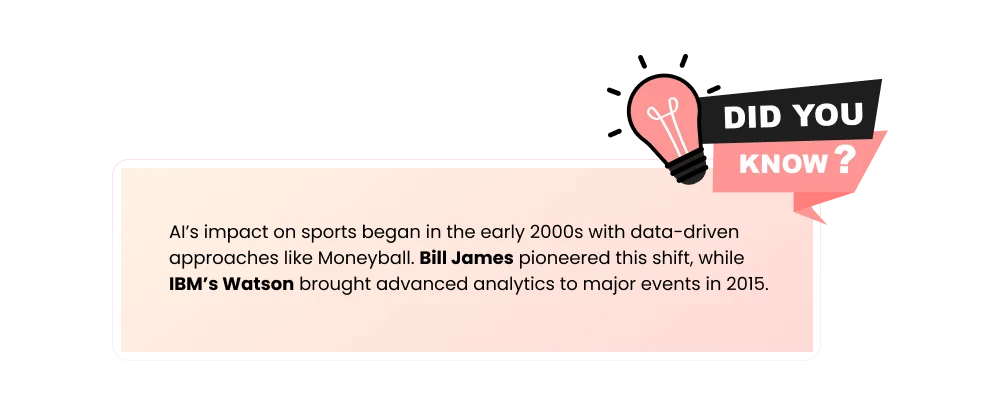
Today, AI isn’t just about analyzing data; it’s a strategic asset helping teams outcompete each other, improve player health and performance, and re-analyze the fan experience.
In this detailed blog, we will delve into the use of AI in sports analytics, from player performance enhancement to e-sports and recruitment strategy, along with challenges that need to be met.
AI in Player Performance Enhancement
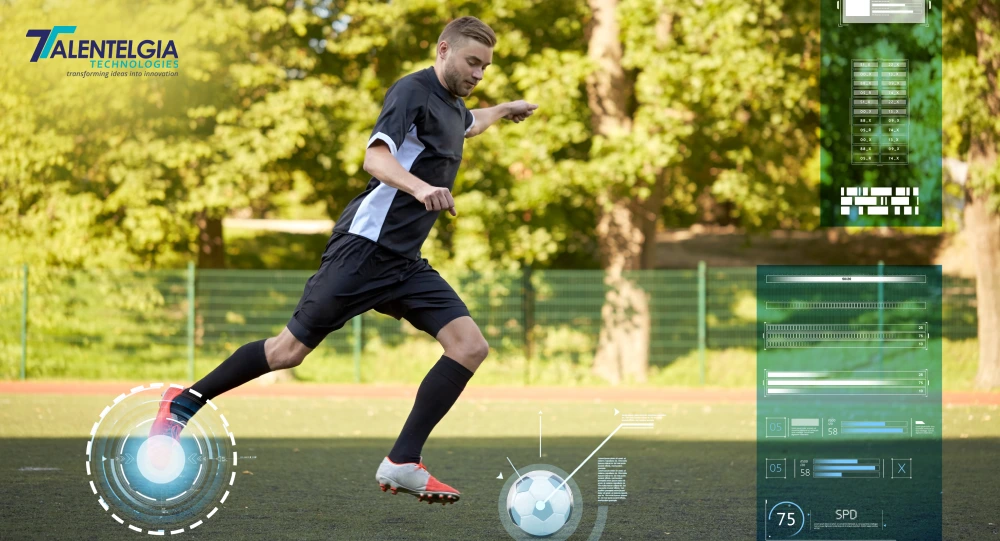
The power of AI in data analysis presents it as a strong tool in the field of athlete performance. Such data from sensors, cameras, and wearables assists AI in bringing a more scientific approach to training, injury prevention, and fatigue management. Let’s dive deeper into how AI shapes athletic performance.
1. AI-Driven Training Programs
While athletes have relied on the expertise of their coaches to enhance performance, AI is taking it to a whole new level. An AI system can process the huge amount of data collected from athletes during training games, ranging from running speed and endurance levels to even reaction times. Consequently, by analyzing these metrics, AI comes up with tailored training programs targeting every single weakness an athlete has, while optimizing his strengths.
For instance, while a sprinter may want to focus on his acceleration over the first meters, it is necessary to perform drills that enhance one’s agility and spatial awareness in basketball. AI software can notice such subtleties faster and with more precision than any human coach could ever do; hence, athletes achieve their full potential without overexertion or injury.
2. Injury Detection and Recovery
Injuries are common in professional sports, while one of the most promising uses of AI involves detection and prevention. A team can track player biomechanics through AI algorithms, such as joint movements and muscle strains. It can target patterns or anomalies that indicate an upcoming injury before symptoms become apparent.
For example, an AI might detect a subtle imbalance in how much stress a soccer player puts on a knee joint and point the anomaly out to the coaching or medical staff. The team then could take action with corrective exercises or rest well in advance of a serious injury that forces the player to the sidelines. AI monitors progress in recovery and can suggest changes needed to a training plan.
3. Fatigue and Stress Monitoring
Fatigue and stress are such factors that may greatly affect athletic performance, whereby in critical moments, efficiency is low on the field and there could be a high risk of injury. Wearable devices equipped with AI sensors can continuously monitor an athlete’s heart rate, oxygen levels, muscle strain, and even stress hormones. By analyzing this data, AI systems determine when a player is reaching near physical or mental exhaustion, therefore helping teams adjust training intensity or game-day participation.
This proactive approach helps the teams manage their athletes’ workload to avoid burnout and to perform at the top during key moments such as play-offs and tournaments.
Data-Driven Game Analytics

Beyond just individual performances, AI gives real-time insight into game dynamics that enables them to make smart decisions and enhance their winning chances.
1. Real-Time Game Analysis
In professional sports, decisions must be made in less than a second. During a match, the AI systems work with live data to track player positions and ball movements down to possession and shooting angles. Where cameras capture every movement, AI can process that in real-time and give coaches insights on how to make tactical adjustments.
Perhaps in a basketball game, AI recognizes that there is a player who continuously gets open looks from the perimeter. This can then be passed along to the coach, who can make changes in the defensive game. On the other hand, utilize this information with the offensive team to further exploit this weakness.
2. Advanced Metrics to Assess Players and Teams
AI can track much more than just basic stats like goals, assists, and rebounds. Advanced metrics from AI provide a depth insight into how AI is being used in sports analytics today.
For example, in soccer, AI might track not only how often a player touches the ball but also the quality of their touches, distance covered at high speed, and contribution to team defense.
Such advanced metrics will further allow the coaches and analysts to assess performances in greater detail and establish strengths and weaknesses that might not have been as evident through traditional statistics. This kind of in-depth analysis is key in formulating game strategies which makes one clear, How is ai being used in sports analytics today? Also, about making informed decisions about player rotation or substitutions.
3. Game Outcome Prediction
Some of the most thrilling usages of AI in sports include the predictive capability. By considering many factors, like past performance, weather, and even mental state, we can predict the outcome of a game with impressive accuracy. This isn’t just useful for fans or sports betting companies; teams also use these predictions to know how to prepare better for their opponents.
For example, AI might predict that a football team will be most tired and less competitive in the fourth quarter because past games show they get exhausted during that time. The other team can then adjust their strategy to use this weakness. AI predictions help teams stay ahead of the competition, giving them an edge.
Also Read: Top AI Development Companies in India
AI in Decision-Making for Coaches and Teams
Probably one of the most impactful usages of AI in sports analytics is to aid coaches and teams in making real-time decisions within games. The ability to analyze in-game data and make informed adjustments can easily make all the difference in the outcomes of matches.
1. Formulating Game Strategies with AI
AI is becoming such an essential tool in preparing for games, being able to analyze big amounts of data. Teams could make use of AI by studying their performance and their opponents to come up with trends and patterns that may not be visible to the naked eye. This will enable the coaches to craft strategies that are finely tuned to not only the strengths of their teams but also to the weaknesses of their opponents.
In soccer, for example, AI makes an in-depth study of an opponent’s tendency to leave gaps in defense when high pressing up the field. With that knowledge, they can develop a counter-strategy that takes advantage of those gaps and leads to greater scoring opportunities.
2. Real-Time Tactical Adjustments using AI
The immediate implications during games are that AI systems increasingly help coaches make strategic changes. AI analyzes in-game data to look at things like player fatigue, weak defense, or the best time for substitutions, giving helpful recommendations.
Think of a basketball game where the opposing team is controlling. AI can rapidly analyze the flow of the game and then suggest adjusting the defense coverage to minimize easy baskets in the post . At the same time recommending how to attain fouls on key players on offense.
3. Opponent Behavior Analysis
It helps the teams not only to analyze their performance but also gives great insight into the opponent’s behavior. AI does so by studying the games of the past where the pattern of an opponent’s attack or defense is reflected to understand his or her move beforehand, thus it might result in wiser game planning, which would counter the opponent’s strengths.
For instance, if an AI system identifies that an opposing playmaker tends to throw deep passes when particular conditions are met, then a football team can adjust its defensive scheme to the threat.
Scouting and Recruitment with AI

Artificial Intelligence is drastically changing the way teams talent-scout and recruit. Using machine learning services to analyze player performance data from the leagues and competitions of the world, AI identifies some top promising players who may even go unnoticed and makes recommendations on how a player could fit into the system of the team.
1. Identifying Emerging Talent with AI
Scouting new talent has long been a labor-intensive process requiring many hours of watching game footage and looking at player statistics. This is different with AI development services, as much of the scouting process is automated. AI systems can analyze data from thousands of players and pinpoint just those who have the right combination of skills, physical attributes, and potential for future development.
This might be utilized by a basketball team to discover a player who is in lower leagues and who has an extremely high shooting percentage from difficult angles. This would suggest that that player may be significantly better than the opponents he has been competing against. Powering through with large amounts of data made possible by AI allows teams to identify such talent more effectively.
2. AI in Player Performance Forecasting
AI can also become an important predictor of the future performances of a player, using his or her past performance data and development trajectory to chart how he or she is more likely to perform in the future. This enables teams to make better decisions about which players to invest in and how much to offer in contract or transfer fees.
For example, AI can predict that a young soccer player, based on his rapid improvement in dribbling and goal-scoring skills, will be a star in a couple of years. That prediction could be made to inform a team’s decision to sign early before its market value goes up astronomically.
3. Improving Transfer Market Strategies
AI also helps teams to move with more strategy in the transfer market. Through the analysis of player performance, contract data, and team needs, it may recommend which transfers will be most valued or if a player is worth the price asked for. This reduces the likelihood of making very costly mistakes in the transfer market and increases the likelihood that the team earns from their investment.
Enhancing Fan Engagement with AI
AI influences not only the players on the field but also revolutions in sports engagement among fans. From personalized experiences to AI-enhanced broadcasting, the fan experience today is more engaging and interactive than ever before.
1. Personalized AI Recommendations for Fans
It slowly changes the way fans engage with sports, and AI wants to do that by offering recommendations personalized to their preferences. Analyzing fan behavior as favorite teams, players, and type of content systems can suggest the most relevant games one should watch, merchandise one should buy, or even a personalized highlight reel.
For example, a fan who regularly watches soccer highlights may receive recommendations on forthcoming match action, fantasy sports tips, or the latest exclusive content based on their viewing history. This personal touch will keep the fans in a continuous engagement and encourage deeper interaction with their favorite teams and players.
2. Virtual Assistants and AI-Powered Fan Interactions
AI-powered virtual assistants for many sports teams and broadcasters serve to enhance fan engagement. It could tell them when the games are scheduled, who the players are, or even whether tickets are still available in an instant from what a fan may be asking.
Examples are specific virtual assistants that, during up-and-coming games, can provide good seating options for fans or real-time updates on the injury condition of a player. Artificial intelligence-driven interactions help fans stay in touch with their favorite sports even when they are not live to watch the games.
3. AR and VR Experiences with AI
Also, AI is creating immersive experiences for fans via AR and VR technologies, making them very much a part of the experience. These experiences will enable fans to get engaged with sports in newer ways: watching a game from multiple camera angles, being a part of virtual fan zones, or even playing with their favorite athletes in virtual simulations.
For example, some broadcasters utilize AI to enhance viewer experience through real-time AR overlays displaying player stats, analysis of games, and replays over actual play, right on screen. These overlays can be interacted with by fans to give a more engaging and interactive experience.
The Future of AI in Sports Analytics
AI technologies are continuously changing, and the use of AI in sports analytics is expected to expand even further. From better game predictions to more engaging virtual fan experiences, AI will make an important difference in the years to come in the future of sports. However, challenges persist, with special mentions of data privacy and the ethical questions of AI decision-making in sports.
Ethical Considerations in AI Use
While AI is offering a great deal, some questions develop from ethical concerns: how much data should teams collect on their players and how should that data be used? Some might look at this and consider the eventual impact: too much emphasis on data-driven decisions might take any human element out of coaching and player management.
As AI continues to grow in sports, teams, and organizations need to balance data-driven insights with the human touch that makes sports so dynamic and unpredictable.
Conclusion
How AI is being used in sports analytics is at the core of fundamentally changing how teams, athletes, and fans interact with sports. From informed decision-making about player performance to real-time tactical decisions, scouting, and personalization for fan experiences, AI is finding its place in modern-day sports.
As this technology advances further, AI integration services will be seen even more in sports, affording new opportunities to push the game to new levels while introducing other challenges that will need to be addressed thoughtfully.


 Healthcare App Development Services
Healthcare App Development Services
 Real Estate Web Development Services
Real Estate Web Development Services
 E-Commerce App Development Services
E-Commerce App Development Services E-Commerce Web Development Services
E-Commerce Web Development Services Blockchain E-commerce Development Company
Blockchain E-commerce Development Company
 Fintech App Development Services
Fintech App Development Services Fintech Web Development
Fintech Web Development Blockchain Fintech Development Company
Blockchain Fintech Development Company
 E-Learning App Development Services
E-Learning App Development Services
 Restaurant App Development Company
Restaurant App Development Company
 Mobile Game Development Company
Mobile Game Development Company
 Travel App Development Company
Travel App Development Company
 Automotive Web Design
Automotive Web Design
 AI Traffic Management System
AI Traffic Management System
 AI Inventory Management Software
AI Inventory Management Software
 AI Software Development
AI Software Development  AI Development Company
AI Development Company  AI App Development Services
AI App Development Services  ChatGPT integration services
ChatGPT integration services  AI Integration Services
AI Integration Services  Generative AI Development Services
Generative AI Development Services  Natural Language Processing Company
Natural Language Processing Company Machine Learning Development
Machine Learning Development  Machine learning consulting services
Machine learning consulting services  Blockchain Development
Blockchain Development  Blockchain Software Development
Blockchain Software Development  Smart Contract Development Company
Smart Contract Development Company  NFT Marketplace Development Services
NFT Marketplace Development Services  Asset Tokenization Company
Asset Tokenization Company DeFi Wallet Development Company
DeFi Wallet Development Company Mobile App Development
Mobile App Development  IOS App Development
IOS App Development  Android App Development
Android App Development  Cross-Platform App Development
Cross-Platform App Development  Augmented Reality (AR) App Development
Augmented Reality (AR) App Development  Virtual Reality (VR) App Development
Virtual Reality (VR) App Development  Web App Development
Web App Development  SaaS App Development
SaaS App Development Flutter
Flutter  React Native
React Native  Swift (IOS)
Swift (IOS)  Kotlin (Android)
Kotlin (Android)  Mean Stack Development
Mean Stack Development  AngularJS Development
AngularJS Development  MongoDB Development
MongoDB Development  Nodejs Development
Nodejs Development  Database Development
Database Development Ruby on Rails Development
Ruby on Rails Development Expressjs Development
Expressjs Development  Full Stack Development
Full Stack Development  Web Development Services
Web Development Services  Laravel Development
Laravel Development  LAMP Development
LAMP Development  Custom PHP Development
Custom PHP Development  .Net Development
.Net Development  User Experience Design Services
User Experience Design Services  User Interface Design Services
User Interface Design Services  Automated Testing
Automated Testing  Manual Testing
Manual Testing  Digital Marketing Services
Digital Marketing Services 
 Ride-Sharing And Taxi Services
Ride-Sharing And Taxi Services Food Delivery Services
Food Delivery Services Grocery Delivery Services
Grocery Delivery Services Transportation And Logistics
Transportation And Logistics Car Wash App
Car Wash App Home Services App
Home Services App ERP Development Services
ERP Development Services CMS Development Services
CMS Development Services LMS Development
LMS Development CRM Development
CRM Development DevOps Development Services
DevOps Development Services AI Business Solutions
AI Business Solutions AI Cloud Solutions
AI Cloud Solutions AI Chatbot Development
AI Chatbot Development API Development
API Development Blockchain Product Development
Blockchain Product Development Cryptocurrency Wallet Development
Cryptocurrency Wallet Development About Talentelgia
About Talentelgia  Our Team
Our Team  Our Culture
Our Culture 
 Healthcare App Development Services
Healthcare App Development Services Real Estate Web Development Services
Real Estate Web Development Services E-Commerce App Development Services
E-Commerce App Development Services E-Commerce Web Development Services
E-Commerce Web Development Services Blockchain E-commerce
Development Company
Blockchain E-commerce
Development Company Fintech App Development Services
Fintech App Development Services Finance Web Development
Finance Web Development Blockchain Fintech
Development Company
Blockchain Fintech
Development Company E-Learning App Development Services
E-Learning App Development Services Restaurant App Development Company
Restaurant App Development Company Mobile Game Development Company
Mobile Game Development Company Travel App Development Company
Travel App Development Company Automotive Web Design
Automotive Web Design AI Traffic Management System
AI Traffic Management System AI Inventory Management Software
AI Inventory Management Software AI Software Development
AI Software Development AI Development Company
AI Development Company ChatGPT integration services
ChatGPT integration services AI Integration Services
AI Integration Services Machine Learning Development
Machine Learning Development Machine learning consulting services
Machine learning consulting services Blockchain Development
Blockchain Development Blockchain Software Development
Blockchain Software Development Smart contract development company
Smart contract development company NFT marketplace development services
NFT marketplace development services IOS App Development
IOS App Development Android App Development
Android App Development Cross-Platform App Development
Cross-Platform App Development Augmented Reality (AR) App
Development
Augmented Reality (AR) App
Development Virtual Reality (VR) App Development
Virtual Reality (VR) App Development Web App Development
Web App Development Flutter
Flutter React
Native
React
Native Swift
(IOS)
Swift
(IOS) Kotlin (Android)
Kotlin (Android) MEAN Stack Development
MEAN Stack Development AngularJS Development
AngularJS Development MongoDB Development
MongoDB Development Nodejs Development
Nodejs Development Database development services
Database development services Ruby on Rails Development services
Ruby on Rails Development services Expressjs Development
Expressjs Development Full Stack Development
Full Stack Development Web Development Services
Web Development Services Laravel Development
Laravel Development LAMP
Development
LAMP
Development Custom PHP Development
Custom PHP Development User Experience Design Services
User Experience Design Services User Interface Design Services
User Interface Design Services Automated Testing
Automated Testing Manual
Testing
Manual
Testing About Talentelgia
About Talentelgia Our Team
Our Team Our Culture
Our Culture
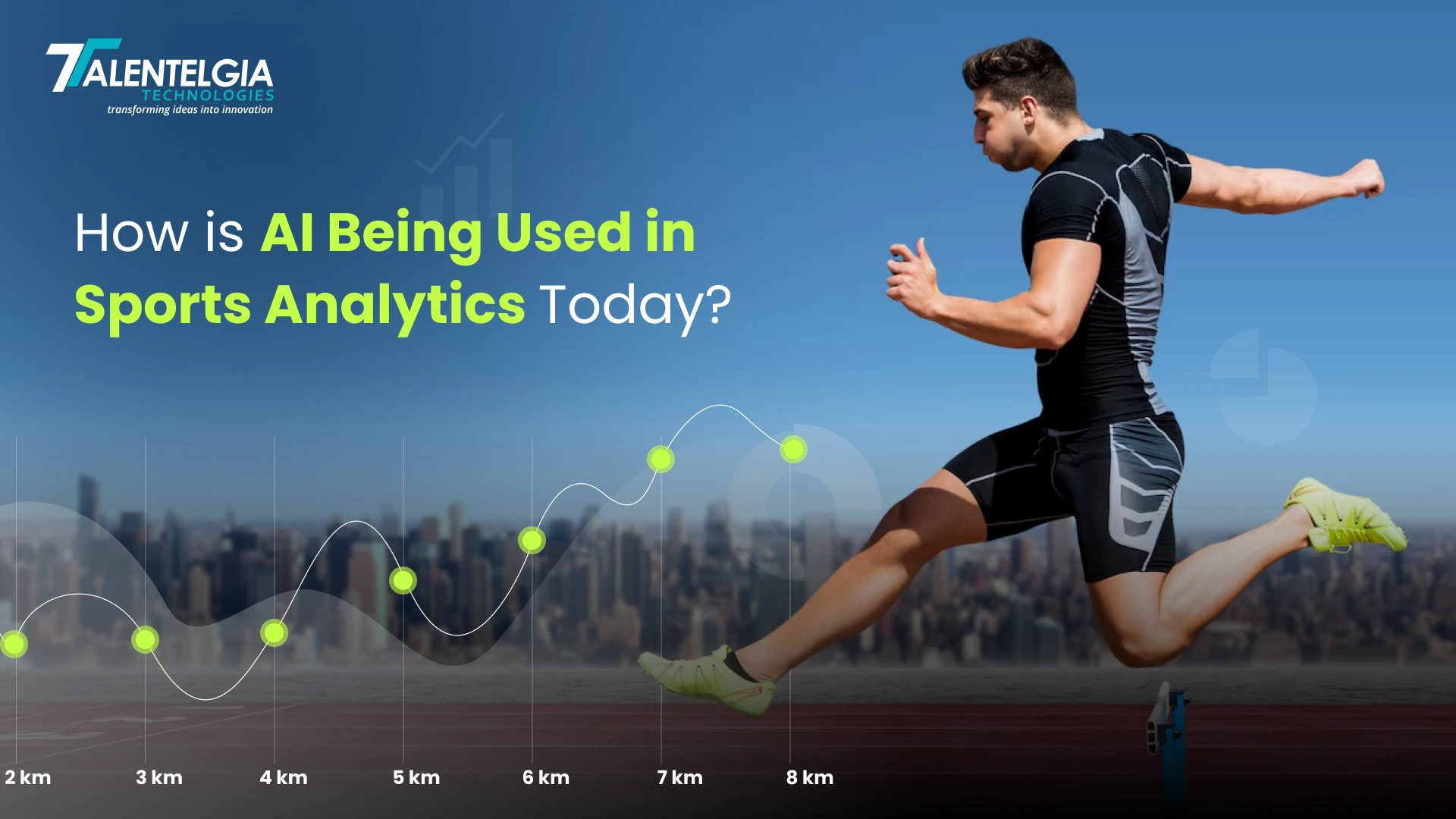

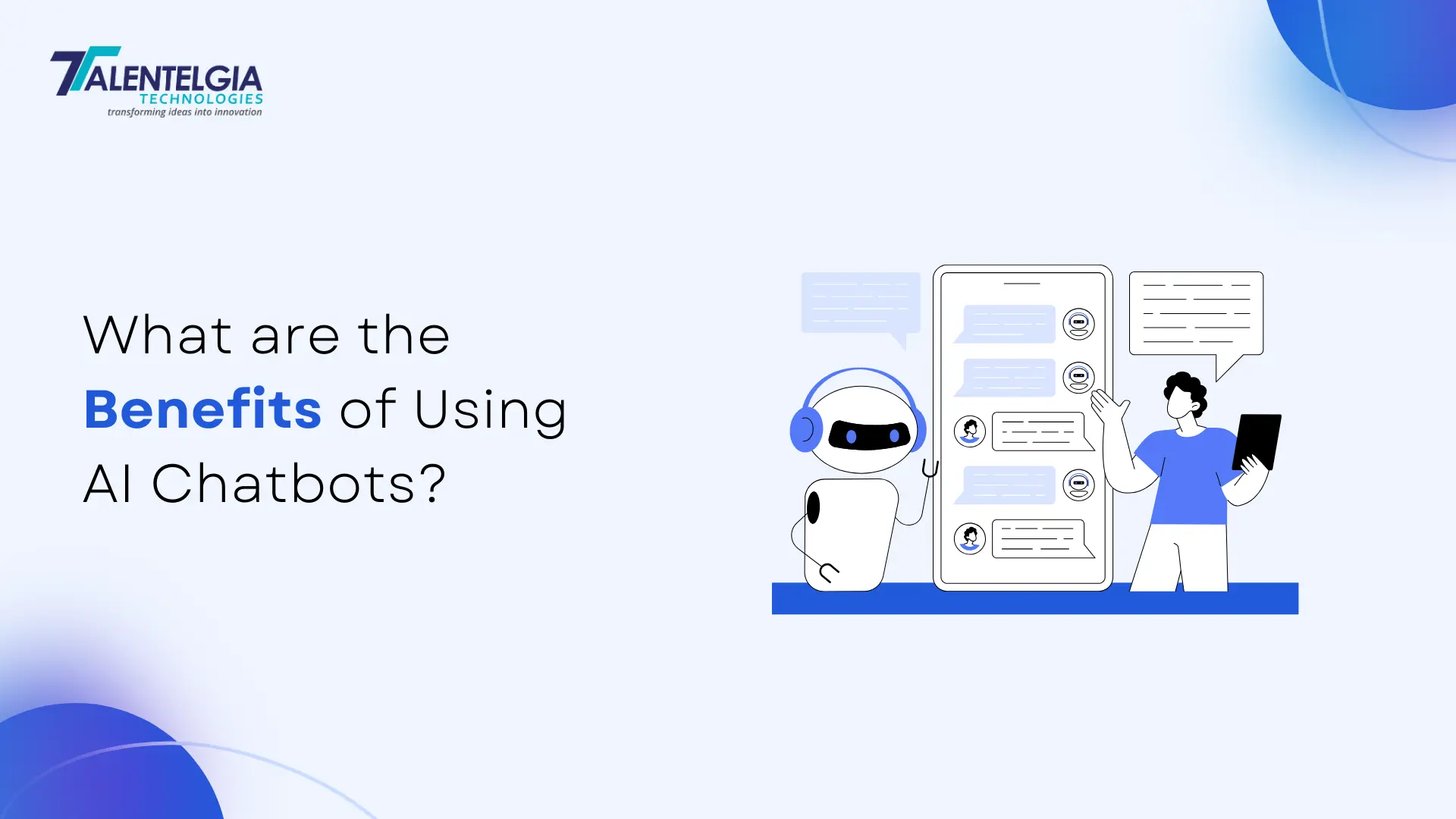

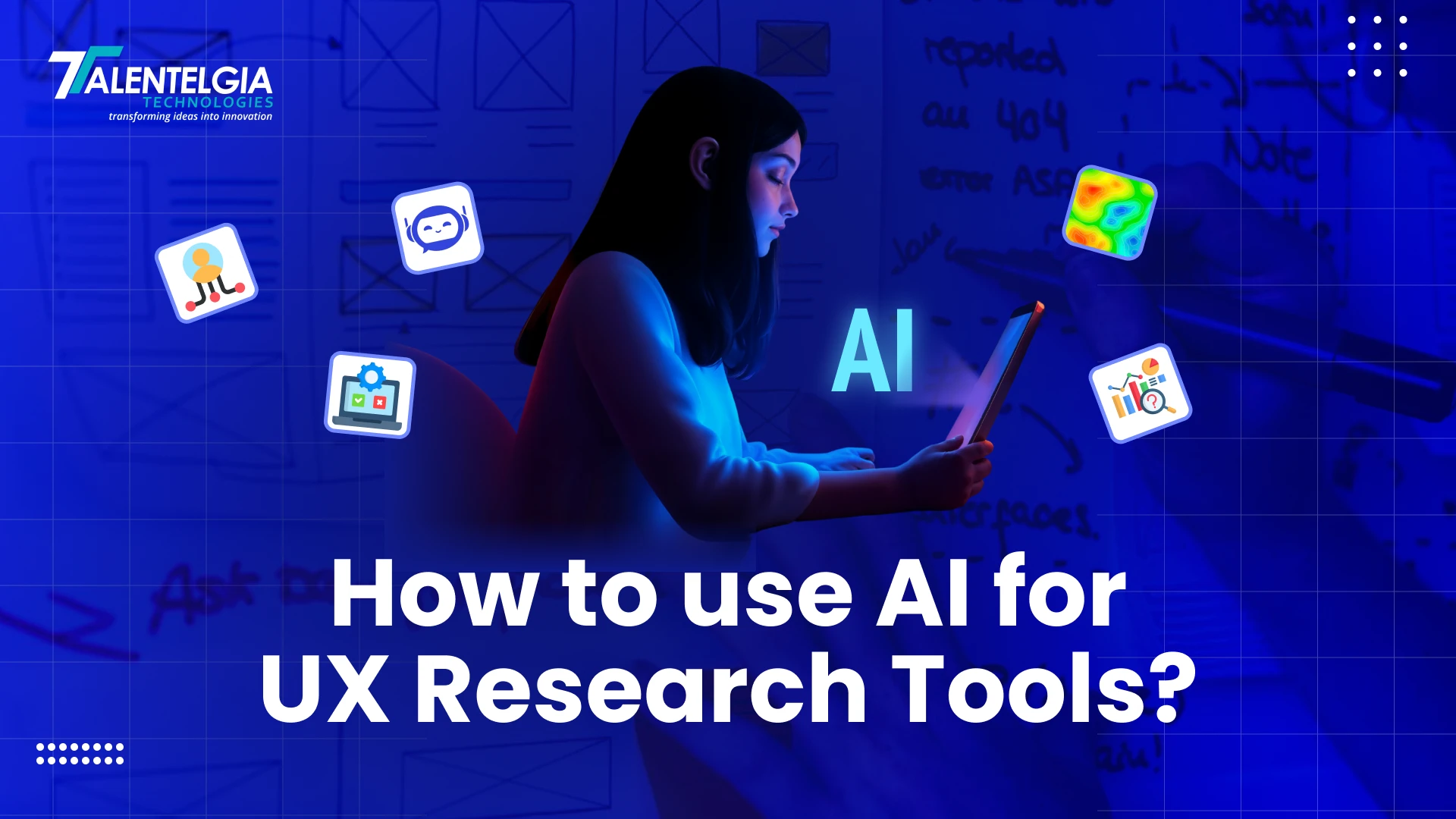












 Write us on:
Write us on:  Business queries:
Business queries:  HR:
HR: 




